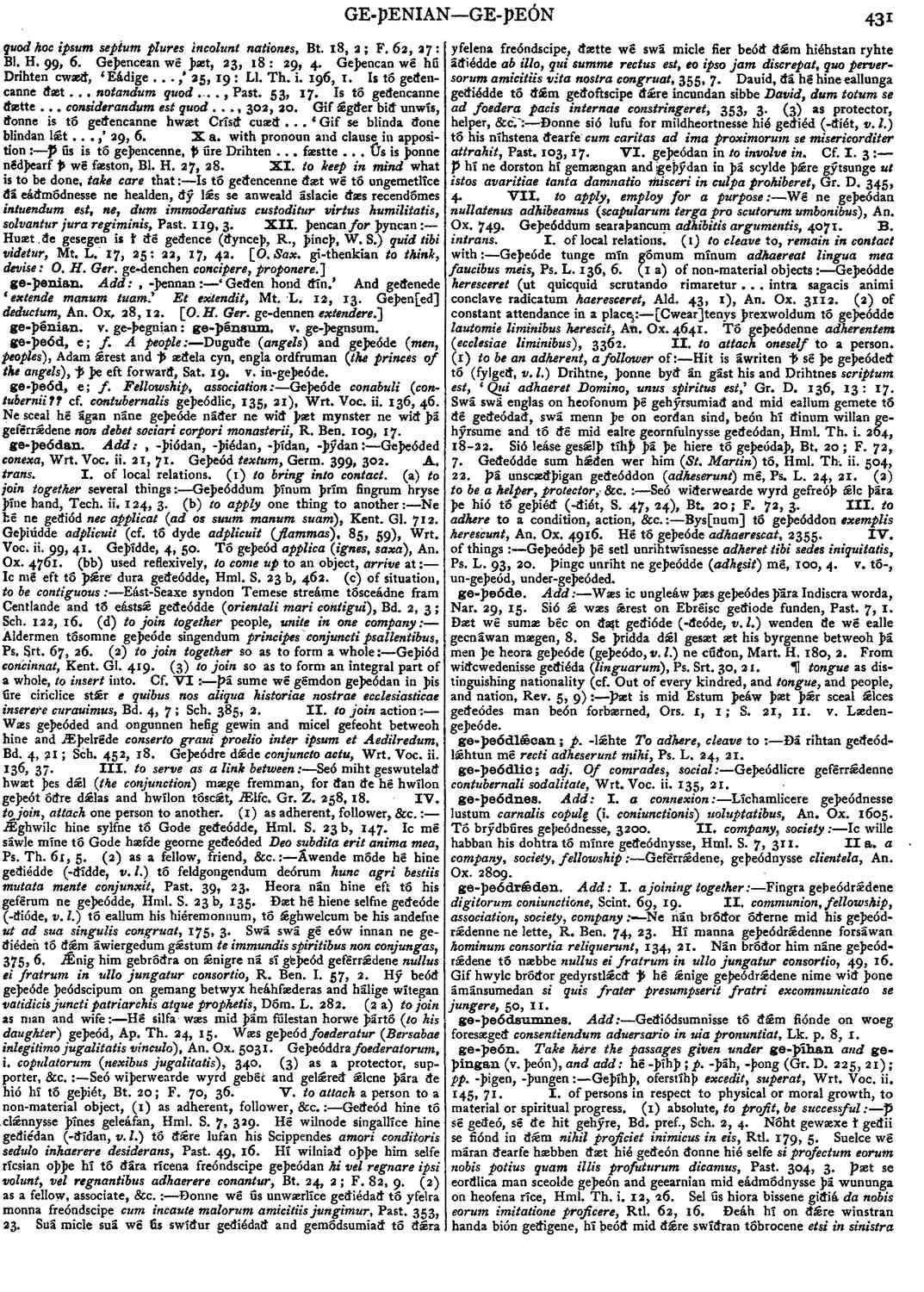ge-þeón
- verb [ contracted ]
-
Geþíhþ, oferstíhþ
excedit, superat,
- Wrt. Voc. ii. 145, 71.
-
Ꝥ sé geðeó, sé ðe hit gehýre,
- Bd. pref., Sch. 2, 4.
-
Nóht gewæxe ł geðii se fiónd in ðǽm
nihil proficiet inimicus in eis,
- Rtl. 179, 5.
-
Suelce wé máran ðearfe hæbben ðæt hié geðeón ðonne hié selfe
si profectum eorum nobis potius quam illis profuturum dicamus,
- Past. 304, 3.
-
Ꝥæt se eorðlica man sceolde geþeón and geearnian mid eádmódnysse þá wununga on heofena ríce,
- Hml. Th. i. 12, 26.
-
Sel ús hiora bissene giðiá
da nobis eorum imitatione proficere,
- Rtl. 62, 16.
-
Ðeáh hí on ðǽre winstran handa bión geðigene, hí beóð mid ðǽre swíðran tóbrocene
etsi in sinistra ejus proficiunt, dextera franguntur,
- Past. 389, 25.
- ¶ ge-þigen, -þogen; pp.
-
Befæste hé his sunu tó láre ... for ðám þe on ðám dagum ne mihte nán man beón geþogen (
a man could not get on
), búton hé hǽþene béc hæfde geleornod and þá cræftas cúþe þe káseras þá lufodon,- Hml. S. 35, 10.
-
Ðá ðe ðonne giét tó ðǽm gewintrede ne beóð ne geðiegene (-þigene, v. l.) (cf. ðá ðe unmedome bióð tó ðǽre láre oððe for gioguðe oððe for unwísdóme
quos a praedicatione imperfectio vel aetas prohibet,
19),- Past. 375, 15.
-
Hálige menn ... wundorlíce geþogene ... wé ... ne magon ðá þing gefyllan þe hí gefremodon,
- Hml. S. 12, 280.
-
Heó on þá kynewísan geþéh, eall swá hire gecynde wæs,
- Chr. 1067; P. 202, 18.
-
On Godes láre geþogen,
- Ælfc. T. Grn. 12, 34.
-
On ðeáwum geþogen tó Godes þénungum
by moral excellence fit for God's services,
- Ll. Th. ii. 380, 27.
-
Is se man betera, gif hé Gode geðíhð (
if he advances spiritually so as to gain the favour of God
), þonne ealle ðá nýtenu sindon,- Hml. Th. i. 16, 14.
- Se mǽsta ðǽl þǽra manna þe Gode geðeóð, þurh clǽnnysse hí geðeóð, ii. 22, 15.
-
Micel menigu geðeáh Gode of Iudéiscre ðeóde,
- 376, 9.
- Þá gecorenan ðe Gode geþugon ðurh martyrdóm, i. 444, 16.
-
Se bid gesǽlig ... þe mæg ... his þeódne geþeón, and þonne mót habban heofonríce
felix ... qui ... conjunctus Christo coelestia regna tenebit,
- Dóm. L. 251.
-
Geðícð se æðeling tó heálicum cynesetle
the prince is promoted to a lofty throne,
- Hml. Th. i. 110, 27.
-
Oþ ꝥ hé geþeáh (geþong, v. l.) tó árwyrþum þeáwum
usque ad reverendos provexit mores,
- Gr. D. 225, 21.
-
Hé þǽr geþéh tó gódon men
he there developed into a good man,
- Chr. 1057; P. 188, 11.
-
Gif hé beó tó þám gewelegod ꝥ hé hýred áge ... Gif hé ne geþeó búton tó healfre híde (
if his property does not exceed half a hide
),- Ll. Th. i. 188, 1.
-
Sé ðe eornost næfð, earfoðlíce hé sceal ǽfre geðeón tó ǽnigre geðingðe
hardly shall he ever be advanced to any dignity,
- Hml. A. 48, 584.
-
Hé æfter fæce geðeáh (-þáh, v. l.) þæt hine man tó mæssepreóste hálgode
postmodum ad ordinem presbyterii promotus est,
- Bd. 3, 23; Sch. 305, 13: Ll. Th. i. 182, 16.
-
Gif leornere wǽre ꝥ þurh láre geþuge ꝥ hé hád hæfde,
- 192, 12.
-
Geþeón þæt hé wese þrísthycgende
to succeed in being daring,
- Gn. Ex. 50: Gn. C. 44.
-
His wæstmas genihtsumlíce geþugon (
uberes fructus ager attulit,
- Lk. 12, 16), Wlfst. 286, 16.
-
Sé þe his þeódenstól geþeón wile,
- Víd. 13.
-
Him seó dǽd ne geþeáh
the deed did not profit him,
- Sat. 576.
-
Ꝥte ús fæsten giðii (
proficiat
),- Rtl. 14, 26.
-
Giðii (
prosit
) ús gibed,- 70, 7.
- II a. of persons, to be produced in abundance. Cf.
-
Of ðám mynstre geðugon æðele biscopas þurh Martines láre gehwilcum leódum
there was an ample crop of noble bishops from the monastery through Martin's teaching for every people,
- Hml. Th. ii. 506, 24.
Bosworth, Joseph. “ge-þeón.” In An Anglo-Saxon Dictionary Online, edited by Thomas Northcote Toller, Christ Sean, and Ondřej Tichy. Prague: Faculty of Arts, Charles University, 2014. https://bosworthtoller.com/50088.
Checked: 0